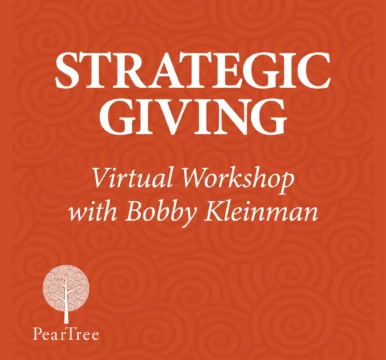This Forum contains the sole opinions & insights of the author based on forty years of providing advice to donors and charities. Others may totally disagree with the author’s views. This Forum is intended as a conversation. Robust debate is invited. Please respond with questions and alternative viewpoints to askbobby@peartreecanada.com
The Federal Budget of February 18, 1997 created a new incentive for gifts to public charities in Canada. From then on, the taxable capital gain which would normally be realized on a gift of marketable securities, would be reduced in half. Later Budgets removed the entire gain from tax and opened the incentive to gifts to private foundations.
This change (which was a project of Mr. Don Johnson, thank-you, Don) has changed the landscape of giving in Canada. First, there is the obvious benefit of this particular gift. But more, it made Canadians think before writing a cheque to their favourite charity. Perhaps you will actually plan your gift. Maybe there are other assets which could be gifted. Mr. Johnson has continued his efforts by lobbying government to add incentives for gifts of real estate, and private company shares, perhaps we will see these in the future.
The first step in looking at the incentive is to understand the tax issue. When one gifts capital property one is deemed to have disposed of the property (as if it was sold) with the proceeds of disposition equal to the value of the gift. Therefore, if one gifts ‘Capital Property A’ with a value of $100 and a cost base (ACB) of $60, there would be a gain of $40 realized. Today, 50% of capital gains are taxable (there have been different rates in the past) so $20 would be taxable. Of course, the donor would receive a $100 donation receipt.
If there is no potential gain, no appreciation, do not bother. We are looking for appreciation and the more appreciation the merrier.
There is an election (subsection 118.1(6) of the Income Tax Act) to eliminate the taxable capital gain. In the above example, you could elect to have your proceeds of disposition to be $60 and thus no capital gain; however, the charity receipt would be useable only to the elected amount or $60. This election does not seem worthwhile, why give up $1 of receipt to avoid 50 cents of taxable gain? This was more useful when the charity limit was 20% of income.
Today, you can use your receipts against 75% of income. However, this was once 20% and there were situations, say, in a gift of a $1m building where the taxable income created was more than the useable receipt and thus the need for the election. We hardly see this currently.
We have decided to gift appreciated marketable securities – which ones? We have added a word – ‘appreciated’. If there is no potential gain, no appreciation, do not bother. We are looking for appreciation and the more appreciation the merrier.
Do not look at the amount of appreciation look at the percentage of appreciation. Brokers supply monthly statements, which contain the values of shares and their costs.
Two holdings:
- MIC value $300,000 ACB $250,000 – gain $50,000
- ROC value $25,000 ACB $5,000 – gain $20,000.
If, in the normal course of investing, I was planning to sell MIC imminently and I intend to hold ROC indefinitely, I may choose MIC – save the tax today.
Otherwise, and assuming I wished to make a $10,000 donation I would do some math. The gain percentage of MIC is 16.67%. The gain percentage of ROC is 80%. I would choose to gift $10,000 of ROC, receive a $10,000 donation receipt and the $8,000 gain would not be taxed. Therefore, we have picked ROC, even if the gain quantum of MIC is $50,000, greater than the gain quantum of ROC, $20,000. Gain percentages are the key.
Value of Receipt
CRA has suggested using the closing value on the date of gift as the receipt value. However, one can use other values from the day, i.e., average in the day, if reasonable. Keep the documentation for the files.
Note that the gift occurs on the transfer of the securities to the charity’s account. The sale by the charity has nothing to do with the gift. The charity does not have to sell the securities. The commission on the sale has nothing to do with the receipt – the commission does not reduce the receipt value.
DO NOT SELL THE SECURITIES AND GIFT THE PROCEEDS TO THE CHARITY – GIFT THE SHARES AND THE CHARITY SELLS.
Qualified Securities
Shares on designated stock exchanges, and shares (or units) of a mutual fund, which invests in qualified securities, qualify. Designated stock exchanges are described in the notes to Section 262 of the Act. It includes the known exchanges in Canada, the US, and 29 other countries. It is hard to find marketable securities that do not qualify.
Charity Setup
A charity should have a brokerage account set up (or many accounts). The broker should supply the charity with a transfer sheet evidencing the account numbers, which the charity supplies to the donor, for the donor to indicate what shares are to be gifted, to sign, and supply to their broker for execution. Major gifts solicitors should have the template form on hand.
Charities should have a gift acceptance policy setting out the acceptance but also the rules of disposition. Many charities have a policy of immediate disposition. If one does not dispose immediately, there is the possibility of greater benefit or loss. If loss the donor is angered; it always seems to go bad – sell immediately!
Tax Shelter Legislation
Subsection 248(35) of the Act sets out that you must hold capital property for at least three years to obtain a full value receipt. If the holding period is less, then the receipt is the cost. There is an exception for listed securities. Therefore, there is no problem holding period for marketable securities, which includes mining flow-through shares.
Death
Gifts from a will or after death can be done with appreciated marketable securities. This is effective as on death (or the second death of a couple) one is deemed to dispose of those appreciated securities, so gifting them eliminates the tax on them.
The gifting rules on death are a bit different now. The gift does not occur because the gift is described in a will. The gift occurs when the estate actually transfers the shares, which of course would occur after death. The value of the gift is at the date of transfer, not the date of death. The estate can elect in its tax return to use the receipt on the final tax return.
I tend to automatically add to a will gift – I direct my executors or liquidators to make this gift in the form of appreciated marketable securities, to the extent possible.
Donor-Advised Funds (DAFs)
Generally, one takes the trouble to gift securities for major gifts, not small ones. One of the reasons DAFs are so popular is that it makes marketable security or mining flow-through gifts to a DAF valuable for major gifts but also for smaller gifts. There are a few charities that have created DAFs at their institutions to provide better service to their donors (and to better the relationship). Many more will follow. Of course, financial institutions and community foundations offer this ability.
No Exemptions
Transferring marketable securities to a charitable remainder trust does not achieve an exemption. Donating mining flow-through shares does not achieve an exemption, although if the mining shares are a strategic mining investment in Quebec, the Quebec personal investor can receive an exemption on their Quebec return.
Other Asset Exemptions
Ecological land, and art governed under the Canadian Cultural Property Act can be donated without a capital gains realization.
Corporations
Yes, a gift of marketable securities from a company will achieve an exemption. There are other beneficial tax results, which makes low-ACB corporate security gifts tremendous. The next issue of the Forum will be devoted to this PG and it will begin the conversation of company gifts.
We’d love to hear from you! Please direct any questions to askbobby@peartreecanada.com and the answers will appear in the next Forum.
Robert (Bobby) K leinman FCPA, FCA
leinman FCPA, FCA
Bobby started in philanthropy in August of 1994 by becoming the Executive Director of the Jewish Community Foundation of Montreal (JCF) which is seen to be Canada’s most donor-centred foundation.
Previously a Partner in Taxation at Ernst and Young, he is now a Planned Giving Consultant specializing in tax-assisted giving. Bobby has helped many Canadian charities design their planned giving programmes, and has written numerous articles on the subject. He is also Past-President of the Conseil de la Philanthropie du Quebec, the Table Ronde du Quebec of the CAGP, JIAS Canada, JIAS Montreal, and the Mount Royal Tennis Club.



